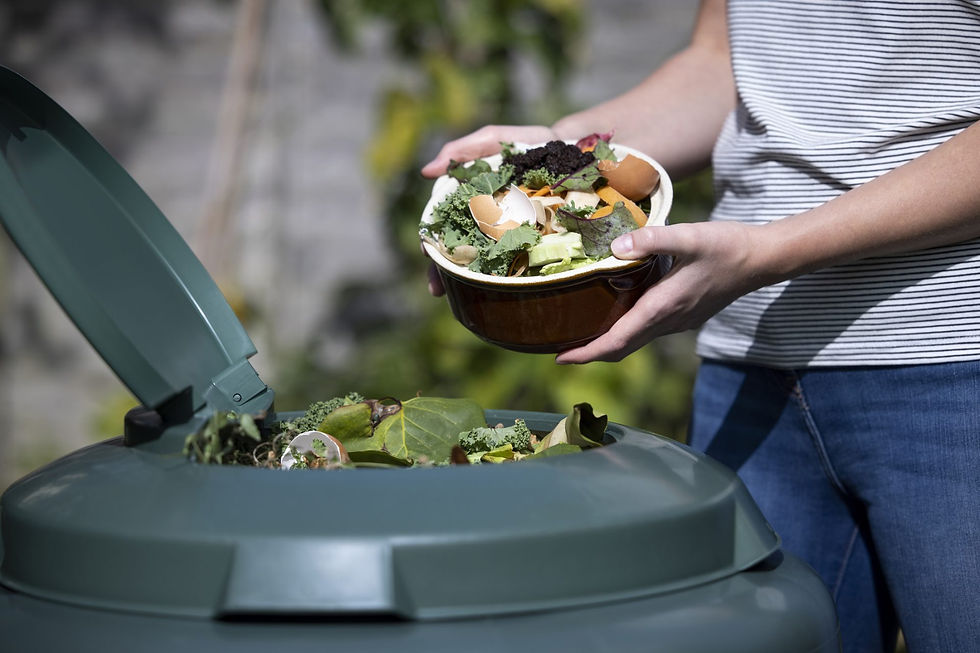Composting as Landfill Diversion
- Edgewater Environmental Coalition
- Dec 4, 2021
- 4 min read
Updated: Jan 25, 2024
Landfill diversion is as it sounds: diverting material away from the landfill for alternate use. Composting is a great example of landfill diversion in action.
Organic waste, like food scraps and spoiled produce, can be used to make compost. The compost process, which is a biological process, breaks down this organic material into an organic fertilizer for use in soil. Some municipalities allow backyard composting, some offer municipal compost/organic waste services, and others permit businesses to haul and process organic waste. In any case, organic waste is diverted from the landfill.
Landfilling organic waste like produce, meats, dairy, etc., has been shown to be hazardous for the environment. The decomposition of organic waste produces methane and leachate. This leachate becomes toxic as it corrodes everything else buried in the landfill, and if a landfill was not properly constructed, this toxic leachate will pollute the surrounding environment until the landfill is remediated. Unfortunately, remediating landfills is proving to be a hazardous and expensive task. See a list with Illinois landfill superfund sites here for examples.
Take our Andersonville/Edgewater Compost Survey to provide information about composting in the greater Edgewater Neighborhood, specifically what is your favorite way to compost, are you interested in composting, and what are your barriers to composting.
Different Ways to Compost in Chicago
Chicago residents have a few different ways to compost whether you live in a high rise, two flat, condo, or community living. Below are some examples of the different types of composting that can be done from the backyard, back porch, or under the sink.
City Provided Services
The city has a Waste Strategy which outlines composting initiatives, to see the currently offered services, such as food waste drop-off sites, visit their website: chicago.gov/city/en/sites/chicago-recycles/home/compost
Service-based Composting
There are a few different types of composting services that pick up right at your back door your food scraps, pizza boxes, and other compostable materials with ease. They can either pick up weekly or bi weekly based on your needs as an individual or as a family. Below is a list of companies that offer residential compost services in Chicago and keep food waste out of the landfill. Please click below to discover which option works best for you if you decide to go the service route. TimeOut Chicago Article
Block Bins: blockbins.com
Collective Resource Compost: collectiveresource.us
Resource Center: theresourcecenterchicago.org
Urban Canopy: theurbancanopy.org/compost-club
WasteNot Compost: wastenotcompost.com
Backyard Composting
If you reside in a building that has access to a backyard, you may be interested in setting up a backyard composting system to help provide healthier soil mix for your vegetable garden or your flowers. Here are a few resources to help you get started with a backyard composting program.
Tools to make your journey easier:
Compost Tumbler
Spade shovel
5-gallon bucket
How to start a compost pile:
Clear a space in your yard or garden, exposing bare soil.
Build a base layer of straw or twigs. ...
Add layers of materials to be composted one at a time, alternating between brown and green materials.
Incorporate a nitrogen source to start decomposition. ...
Keep the pile moist.
Some links to get you started:
If you live where you have friends or neighbors on your block that don’t have access to composting in their residents, you may be able to open your compost pile to help your neighbors. In exchange they can take turns rotating the pile for optimal aeration.
Vermicomposting 101
Vermicomposting is a fun way to get kids involved in learning about composting and “food to soil enrichment: by setting up a worm composting bin in your apartment, house, or school. Composting with using some of nature's most effective nutrient converters. Happy worm farming!
Acquire a bin. ...
Prepare the bedding. ...
Add the worms. ...
Bury food scraps under bedding. ...
Place a full sheet of dry newspaper on top of the bedding. ...
Cover and choose a spot for the bin.
Some links to get you started:
Please note that some of the best worms used for composting that include the nightcrawler and red wigglers are actually a non native species to North America. Please do not release your worms in native habitats as they will compete with native species.
All Composting Success has 2 “Ingredients”
Successful composting in your home based systems comes down to a balance of “Greens” and “Browns.” Composting relies on heat, water, air, and the mixture of "greens" (fresh grass clippings, spent flowers, fruit and veggie scraps) and "browns" (hay, dried leaves, pine needles, etc.). The Chicago Botanic Gardens breaks it down here.
Clark Street Composts
The Andersonville Chamber of Commerce (ACC) is pleased to partner with WasteNot Compost to launch Clark Street Composts, a private-public pilot program aimed at providing a composting model for every neighborhood across Chicago. The initiative launched in the Fall of 2021 with more than 20 local restaurants, bars and other businesses committed to diverting their compostable waste away from landfills to be returned to the community as nutrient-rich soil. For more information click here.
Additional Resources
Check out illinoiscompost.org for additional resources. The Illinois Food Scrap Coalition (IFSC) is a thriving not-for-profit organization advancing diversion and composting of organics in Illinois through advocacy, program implementation, market and business development, policy, and outreach.




Comments